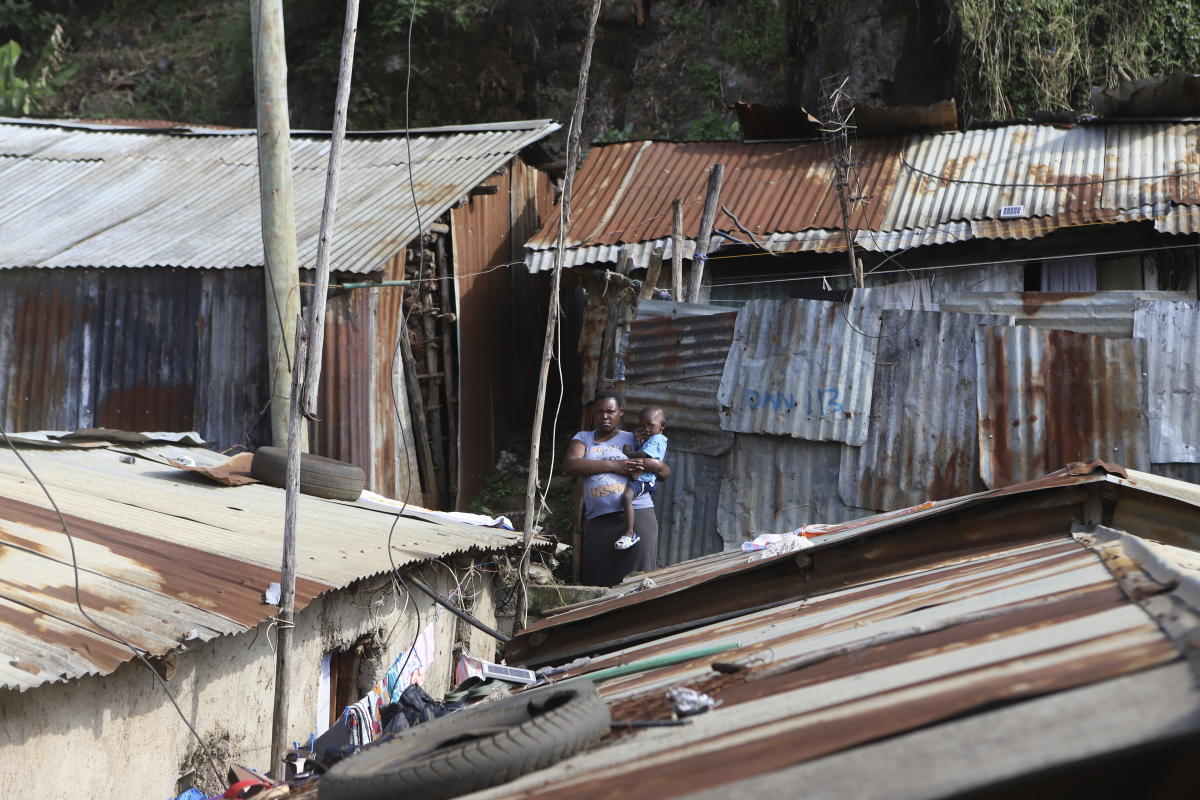NAIROBI, Kenya (AP) — In the heart of the busy Kibera neighborhood of Kenya’s capital, Jacinter Awino shares a small tin house with her husband and four children. She envies those who have escaped such makeshift homes and moved into more permanent homes, which fall under the government’s affordable housing scheme.
The 33-year-old housewife and her mason husband can’t afford the $3,800 purchase price of a one-room government house. Their tin house was built for $380 and has no toilet or running water.
“Those government houses are a dream for us, but our income simply does not allow it,” said Awino.
The government plans to build 250,000 homes each year, aiming to eventually close a housing shortage that the World Bank estimates is 2 million homes. The plan was launched in 2022, but no data is available on how many homes have been completed.
Kenya’s urban areas are home to a third of the country’s total population of more than 50 million. Of those in urban areas, 70% live in informal settlements characterized by a lack of basic infrastructure, according to UN-Habitat.
A number of urban Kenyans have moved to a government housing project on the outskirts of the capital Nairobi. One-bedroom apartments sold there for $7,600 last year.
Felister Muema, a 55-year-old former caterer, has made a down payment of about 10% through a savings plan and expects to pay off the remaining amount in 25 years.
“This is where I started living my life,” she said. “If I do something here, it’s forever. If I plant a flower, no one will tell me, ‘Uproot it, I don’t want it. There.’ This is what gives me life.”
But experts say construction and financing must change and accelerate to address Kenya’s housing shortage.
“We cannot rely on the traditional mortgage route,” said Ishaku Maitumbi, the head of UN-Habitat for East Africa, who recommends a cooperative savings scheme popular with Kenyan businesses.
For residential construction, some are exploring the emerging technology of 3D printing. A machine applies special mortar to form concrete walls and reduces construction time by several days compared to traditional masonry.
One company, 14Trees, has used the technology to build a model home in Nairobi and 10 homes in the coastal area of Kilifi County.
The company’s CEO Francois Perrot said the technology could help address the huge need for housing on the African continent, but that this would take time.
“If we want to close that backlog, we have to build differently, we have to build at scale, at speed and with low-carbon materials. And that is what 3D printing in construction makes possible,” says Perrot.
The company’s homes, like many traditionally built homes, remain out of reach for most Kenyans. A two-bedroom home costs $22,000 and a three-bedroom $29,000. But Perrot argued that buying a printer and making mortar locally would help reduce costs.
“People don’t really care about the technology. What they care about is the design, the price, the way it’s set up and the layout of the building,” he said.
Nickson Otieno, architect and founder of Niko Green, a sustainability consultancy, said such new technology has great potential but remains limited.
“It’s going to be a long time before it can compete with bricks and mortar,” he said. “Bricks and mortar, anybody can build their house wherever they are. They have access to the materials, they have access to the craftsmen who are building the house, and they can plan the costs.”
Financing remains a challenge. In June 2023, Kenya’s parliament passed a finance bill that includes a new housing tax of 1.5% of gross income, to be used to build affordable housing. The bill is being challenged in court. Critics argue that the tax is discriminatory because it only applies to people in formal employment.
If the tax is rejected, the Kenyan government would have to look elsewhere for financing to build affordable housing.
The housing tax is one of the issues causing discontent among young people who have organised a series of protests, including the extraordinary storming of parliament on Tuesday, in which more than 20 people were killed when police opened fire.
President William Ruto has defended the need for the tax.
“We have said that affordable housing, social housing, is a right,” he said earlier this year in response to the legal challenge.
___
The Associated Press receives funding for global coverage of health care and development in Africa from the Bill & Melinda Gates Foundation Trust. The AP is solely responsible for all content. Find AP’s Standards for Working with Charities, a list of supporters, and funded coverage areas at AP.org.







